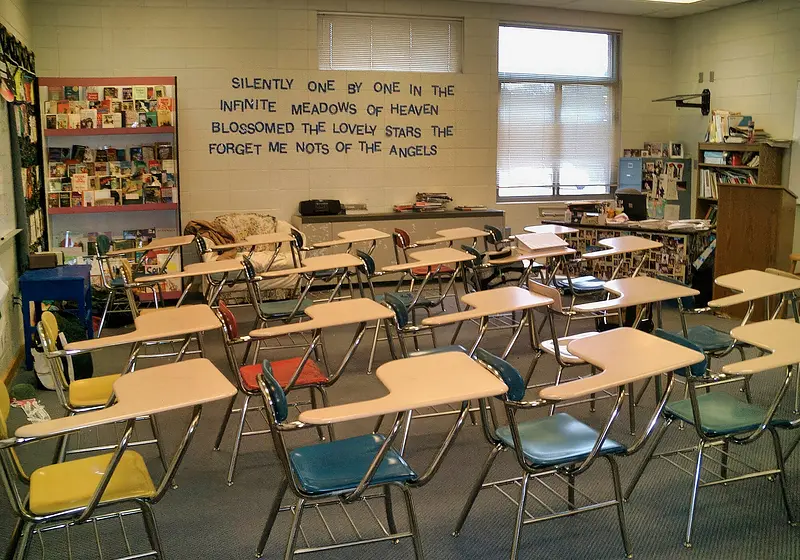Everything is online. Everything is accessible. Everything is pointless.
Let us slide into your dms 🥰
Get notified of top trending articles like this one every week! (we won't spam you)Online School is Ruining Teenagers
Before COVID-19, my schedule was exhausting. I would wake up around 7 am for school. I'd wash my face, brush my teeth, do my hair and makeup, and head to school.
I felt alive as soon as I stepped into school, surrounded by teachers and classmates. I was never drowsy, even if I got no sleep. The atmosphere was bustling, which gave me the motivation to do my best, stay awake, and retain information.
I would socialize. I would laugh. I would learn. Not anymore.
Nowadays many teens live a life like mine. They cannot socialize, laugh, or learn. Socializing and laughing during class time is impossible.
There is zero motivation to do work. All that students experience is awkward silence through empty screens. Day after day is the same exhausting routine.
Every day is the same; nothing new happens. We log on. We do work.
We eat. We do some more work. We go to sleep.
Day. After. Day. This is the case for many teens around the world.

Take the Quiz: Discover Your Ideal Stress-Relieving Hobby
Everyone deals with stress differently, and finding the right hobby can help you relax and unwind. Take this quiz to find out which stress-relievin...
Mental Health At The Cost of Physical Health?
According to the University of Chicago’s behavioral health department, there has been “an increase in the last six months of adolescents (age 12 and up) presenting with anxiety and depression as a result of several factors, including issues stemming from the pandemic.” According to the Psychiatric Times, there have been global studies on the mental health of teens. From China to Spain, to Bangladesh, there are reports of increased loneliness, anxiety, depression, nervousness, and worry. This issue is not just personal.
It is not just me, and it is not just my own country, America. Teens everywhere are suffering from COVID-19.
Before quarantine, I was privileged to experience 1 ½ years of high school. According to UChicago’s behavioral health department, teens are suffering because they have “to mourn the loss of important graduation ceremonies, proms and dances, and other milestone events.” They’ve lost access to each other and the events that help give their lives meaning. Taken seriously, this suggests that most teens are living in a state of emotional disappointment and depression.
Due to online school, I no longer have the ability to try new things in a new environment. I don’t learn as well because I am trapped staring at screens all day, which is difficult for me mentally and physically.
Why Teens Need IRL Interaction
Many teenagers around the world are similarly affected by the COVID-19 situation. According to research, girls are suffering more than boys. In England, there is a significant increase in teen mental health disorders and children report feeling isolated. In Japan, there was an increase in teen suicide, specifically girls.
Everyone is feeling tired, exhausted, and isolated, and there has been an increase in mental health apps to address the issue. While this is better than nothing, this is likely not a long-term solution for sustained mental health. Why? Because we need to interact IRL.
Teens are cut off from seeing people in real life, from interacting with humans in the real world. Everything I do is either on my laptop or phone, and it is not the same as sitting in a classroom with teachers and friends. Many teenagers depend on their school environment peers to help them when they struggle with personal issues.
Without these lifelines in real life, teen mental health will deteriorate as they remain isolated and disconnected from meaningful interaction. Our phones are not the solution.
Teens, Screens, and Declining Mental Health
In a recent Time Magazine article, a study found that “young people who spent seven hours or more a day on screens (not including schoolwork) were more easily distracted, less emotionally stable and had more problems finishing tasks and making friends compared to those who spent just an hour a day on screens.” When it comes to mental health, all-day screen time is harmful.
Adults think that during COVID-19 quarantine teens have it easy because they attend school remotely. In reality, teenagers are struggling more than ever before. Now, we spend seven or more hours on a screen just to attend school and do homework.
Studies show that increased screen time is not healthy for children, and adults claim we spend all our time on our screens, but we’ve been forced to live our entire lives on screens, stuck inside of our homes. With no one to turn to except their screens, the mental health of teenagers begins to deteriorate.
Keeping Everyone Healthy?
Before quarantine, I (and other students) would get home from school and video chat with friends. But now that we are forced to stare at our classmates for 8 hours a day via technology, the idea of looking at another screen is defeating. So teenagers resort to things like sleeping just to pass the time or not look at screens.
Nobody wanted to speak to each other because teenagers are tired of having to look at screens all day. Teens are becoming more disconnected because of digital environments and increased screen time.
Many people want to ignore the effects of increased screen time and teen isolation. Why is it that it seems like so many adults don’t care about the cost of quarantine? Just because we have the responsibility to help keep society healthy does not mean it has to come at the cost of teen mental health.
If collective health and wellness are our primary concern as a society, then we need to have honest discussions about what health is and the cost we ask teens to bear. I am willing to bear this burden, for my grandmother, my family, for others. No option seems ideal.
So what now? What can teenagers do to pick their lives back up? The good news: It will get better.














